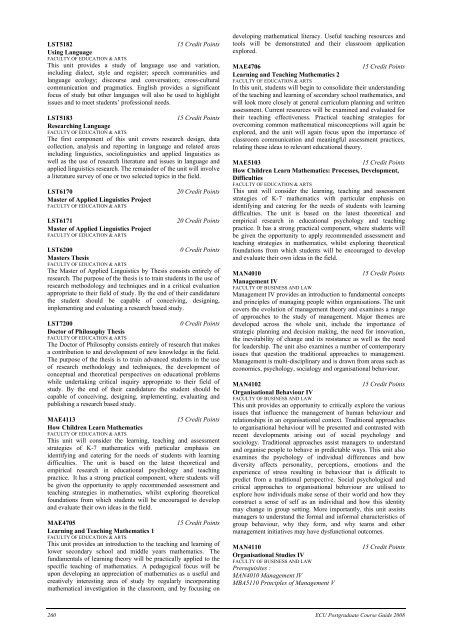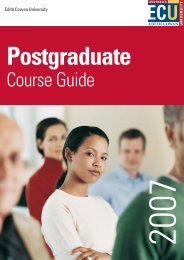Postgraduate - Edith Cowan University
Postgraduate - Edith Cowan University
Postgraduate - Edith Cowan University
Create successful ePaper yourself
Turn your PDF publications into a flip-book with our unique Google optimized e-Paper software.
LST5182 15 Credit Points<br />
Using Language<br />
FACULTY OF EDUCATION & ARTS<br />
This unit provides a study of language use and variation,<br />
including dialect, style and register; speech communities and<br />
language ecology; discourse and conversation; cross-cultural<br />
communication and pragmatics. English provides a significant<br />
focus of study but other languages will also be used to highlight<br />
issues and to meet students’ professional needs.<br />
LST5183 15 Credit Points<br />
Researching Language<br />
FACULTY OF EDUCATION & ARTS<br />
The first component of this unit covers research design, data<br />
collection, analysis and reporting in language and related areas<br />
including linguistics, sociolinguistics and applied linguistics as<br />
well as the use of research literature and issues in language and<br />
applied linguistics research. The remainder of the unit will involve<br />
a literature survey of one or two selected topics in the field.<br />
LST6170 20 Credit Points<br />
Master of Applied Linguistics Project<br />
FACULTY OF EDUCATION & ARTS<br />
LST6171 20 Credit Points<br />
Master of Applied Linguistics Project<br />
FACULTY OF EDUCATION & ARTS<br />
LST6200 0 Credit Points<br />
Masters Thesis<br />
FACULTY OF EDUCATION & ARTS<br />
The Master of Applied Linguistics by Thesis consists entirely of<br />
research. The purpose of the thesis is to train students in the use of<br />
research methodology and techniques and in a critical evaluation<br />
appropriate to their field of study. By the end of their candidature<br />
the student should be capable of conceiving, designing,<br />
implementing and evaluating a research based study.<br />
LST7200 0 Credit Points<br />
Doctor of Philosophy Thesis<br />
FACULTY OF EDUCATION & ARTS<br />
The Doctor of Philosophy consists entirely of research that makes<br />
a contribution to and development of new knowledge in the field.<br />
The purpose of the thesis is to train advanced students in the use<br />
of research methodology and techniques, the development of<br />
conceptual and theoretical perspectives on educational problems<br />
while undertaking critical inquiry appropriate to their field of<br />
study. By the end of their candidature the student should be<br />
capable of conceiving, designing, implementing, evaluating and<br />
publishing a research based study.<br />
MAE4113 15 Credit Points<br />
How Children Learn Mathematics<br />
FACULTY OF EDUCATION & ARTS<br />
This unit will consider the learning, teaching and assessment<br />
strategies of K-7 mathematics with particular emphasis on<br />
identifying and catering for the needs of students with learning<br />
difficulties. The unit is based on the latest theoretical and<br />
empirical research in educational psychology and teaching<br />
practice. It has a strong practical component, where students will<br />
be given the opportunity to apply recommended assessment and<br />
teaching strategies in mathematics, whilst exploring theoretical<br />
foundations from which students will be encouraged to develop<br />
and evaluate their own ideas in the field.<br />
MAE4705 15 Credit Points<br />
Learning and Teaching Mathematics 1<br />
FACULTY OF EDUCATION & ARTS<br />
This unit provides an introduction to the teaching and learning of<br />
lower secondary school and middle years mathematics. The<br />
fundamentals of learning theory will be practically applied to the<br />
specific teaching of mathematics. A pedagogical focus will be<br />
upon developing an appreciation of mathematics as a useful and<br />
creatively interesting area of study by regularly incorporating<br />
mathematical investigation in the classroom, and by focusing on<br />
developing mathematical literacy. Useful teaching resources and<br />
tools will be demonstrated and their classroom application<br />
explored.<br />
MAE4706 15 Credit Points<br />
Learning and Teaching Mathematics 2<br />
FACULTY OF EDUCATION & ARTS<br />
In this unit, students will begin to consolidate their understanding<br />
of the teaching and learning of secondary school mathematics, and<br />
will look more closely at general curriculum planning and written<br />
assessment. Current resources will be examined and evaluated for<br />
their teaching effectiveness. Practical teaching strategies for<br />
overcoming common mathematical misconceptions will again be<br />
explored, and the unit will again focus upon the importance of<br />
classroom communication and meaningful assessment practices,<br />
relating these ideas to relevant educational theory.<br />
MAE5103 15 Credit Points<br />
How Children Learn Mathematics: Processes, Development,<br />
Difficulties<br />
FACULTY OF EDUCATION & ARTS<br />
This unit will consider the learning, teaching and assessment<br />
strategies of K-7 mathematics with particular emphasis on<br />
identifying and catering for the needs of students with learning<br />
difficulties. The unit is based on the latest theoretical and<br />
empirical research in educational psychology and teaching<br />
practice. It has a strong practical component, where students will<br />
be given the opportunity to apply recommended assessment and<br />
teaching strategies in mathematics, whilst exploring theoretical<br />
foundations from which students will be encouraged to develop<br />
and evaluate their own ideas in the field.<br />
MAN4010 15 Credit Points<br />
Management IV<br />
FACULTY OF BUSINESS AND LAW<br />
Management IV provides an introduction to fundamental concepts<br />
and principles of managing people within organisations. The unit<br />
covers the evolution of management theory and examines a range<br />
of approaches to the study of management. Major themes are<br />
developed across the whole unit, include the importance of<br />
strategic planning and decision making, the need for innovation,<br />
the inevitability of change and its resistance as well as the need<br />
for leadership. The unit also examines a number of contemporary<br />
issues that question the traditional approaches to management.<br />
Management is multi-disciplinary and is drawn from areas such as<br />
economics, psychology, socialogy and organisational behaviour.<br />
MAN4102 15 Credit Points<br />
Organisational Behaviour IV<br />
FACULTY OF BUSINESS AND LAW<br />
This unit provides an opportunity to critically explore the various<br />
issues that influence the management of human behaviour and<br />
relationships in an organisational context. Traditional approaches<br />
to organisational behaviour will be presented and contrasted with<br />
recent developments arising out of social psychology and<br />
sociology. Traditional approaches assist managers to understand<br />
and organise people to behave in predictable ways. This unit also<br />
examines the psychology of individual differences and how<br />
diversity affects personality, perceptions, emotions and the<br />
experience of stress resulting in behaviour that is difficult to<br />
predict from a traditional perspective. Social psychological and<br />
critical approaches to organisational behaviour are utilised to<br />
explore how individuals make sense of their world and how they<br />
construct a sense of self as an individual and how this identity<br />
may change in group setting. More importantly, this unit assists<br />
managers to understand the formal and informal characteristics of<br />
group behaviour, why they form, and why teams and other<br />
management initiatives may have dysfunctional outcomes.<br />
MAN4110 15 Credit Points<br />
Organisational Studies IV<br />
FACULTY OF BUSINESS AND LAW<br />
Prerequisites :<br />
MAN4010 Management IV<br />
MBA5110 Principles of Management V<br />
260 ECU <strong>Postgraduate</strong> Course Guide 2008



